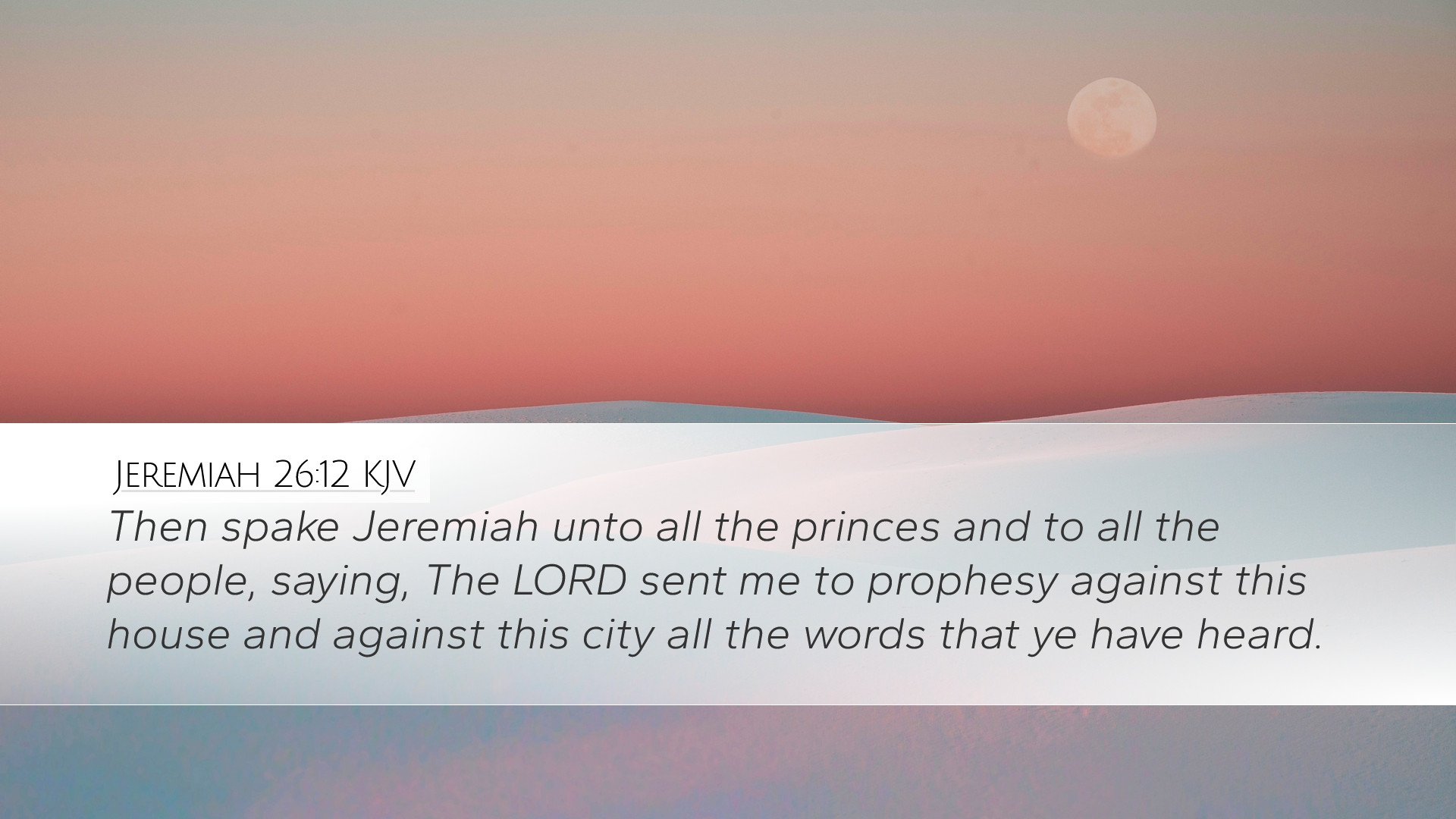Commentary on Jeremiah 26:12
Verse: "Then spake Jeremiah unto all the princes and to all the people, saying, The LORD sent me to prophesy against this house and against this city all the words that ye have heard." (Jeremiah 26:12)
Context and Historical Background
Jeremiah 26 occurs in a critical period of Judah's history, during the reign of King Jehoiakim. The people of Judah were steeped in idolatry and moral corruption, and Jeremiah's prophetic ministry was a direct challenge to the status quo. This chapter highlights the tension between true prophetic witness and the prevailing political and religious sentiments.
Insights from Matthew Henry
Matthew Henry notes that Jeremiah's boldness in delivering God's message showcases the prophet's fearlessness. He emphasizes that Jeremiah was compelled by divine command to speak, despite the potential consequences. Henry categorizes the people’s response to Jeremiah’s message, indicating how it was largely one of resistance, reflective of their hard-heartedness toward the truth.
Henry further elaborates on the role of prophets as watchmen over God’s people. Jeremiah's role was not only to deliver a message of judgment but also to call the people to repentance. This dual aspect of prophetic ministry—warning and calling to repentance—is central to understanding the heart of God's message through His prophets.
Insights from Albert Barnes
Albert Barnes expands on the prophetic call, emphasizing that Jeremiah's task was monumental. He observes that despite the likelihood of persecution, Jeremiah remained steadfast. Barnes asserts that the essence of the prophet’s message was a divine order to proclaim judgment, which was not merely a declaration of doom but a plea for awareness and correction among the people.
Furthermore, Barnes correlates the historical instances of rebellion against God’s word with the content of Jeremiah’s message. He highlights that Jeremiah’s audacious declaration about the fate of Jerusalem was not just political commentary; it was deeply theological, asserting God’s sovereignty and the inevitable consequences of rebellion against Him.
Insights from Adam Clarke
Adam Clarke provides a more nuanced interpretation of the prophet's audience—both princes and people. Clarke details that this distinction indicates the wide-reaching implications of Jeremiah’s message; it was directed at leaders who had significant influence over the populace. He emphasizes that the prophetic word is not just for the individual but has communal accountability.
In his analysis, Clarke also notes the historical significance of this moment. He contextualizes the tension in Jerusalem, where the king’s response to Jeremiah's prophecy was indicative of a larger pattern of dismissing divine counsel in favor of popular opinion. For Clarke, Jeremiah embodies the struggle of the faithful amid a faithless generation.
Theological Implications
Jeremiah 26:12 encapsulates the prophetic tension between divine command and human response. Pastors and theologians can glean several key theological principles from this verse:
- The Authority of God's Word: The verse affirms that the authority behind Jeremiah’s proclamation is God Himself. This principle highlights the necessity for Biblical preaching to be grounded in Scripture as the ultimate source of truth.
- The Cost of Discipleship: Jeremiah faced immense opposition and threat to his life, reminding believers that faithfulness to God’s call often comes with significant personal cost.
- The Role of Prophets: The role of prophets transcends mere foretelling; it includes forth-telling—a call to social and moral action. This reflects the ongoing need for prophetic voices in contemporary society.
- The Urgency of Repentance: The primary message of Jeremiah was not just judgment but an invitation to repentance. This highlights God’s desire for His people to return to Him, reflecting His merciful nature.
Pastoral Application
For pastors, the message contained in this verse serves as a reminder to shepherd their congregations with both truth and grace. Just as Jeremiah delivered a message fraught with potential contention, church leaders are called to address societal sins and call for repentance, trusting in God’s sovereignty over the outcome.
Conclusion
Jeremiah 26:12 serves as a powerful testament to the enduring relevance of prophetic witness. The insights of Matthew Henry, Albert Barnes, and Adam Clarke converge to underscore the essential characteristics of biblical prophecy: divine authority, a call to repentance, and the prophetic voice's social implications. For scholars and pastors alike, engaging deeply with this text offers a fresh perspective on the ongoing need for faithful witnesses in an often resistant world.


